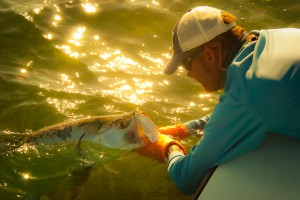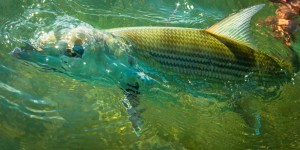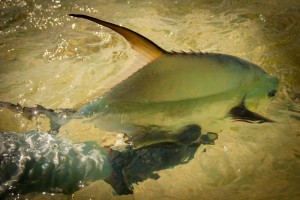Another interview from readers suggestions. This time it is Capt. Joel Dickey, another Keys guide. Joel has been out with the Gink & Gasoline guys and knows one or two dozen good thing to know about fishing in the Keys.
How much of an off-season do you get down there in Florida and what do you do when
you aren’t guiding?
Well in my honest opinion there are great opportunities for fishing year round in the Keys. I would put it in that there is a “softer” season as opposed to an off season. The Keys is famous for tarpon season which runs from March until mid July. However some of the best opportunities for the “grand slam” is from late June till September. From September to mid November is spectacular bone fishing and permit fishing.. And yes there are still some tarpon around then too. as for the ” soft season ” I would say mid-November to the end of January. Don’t get me wrong though the big three can still be caught during these months the weather just has to be right. As far as what I do in the off season? Fish of course! What else is a guide to do? I also tie flies, come up with new patterns for the upcoming season. I also like to take photos during my trips and this is a time I can really edit photos. However this year I plan on hosting some trips to the Bahamas and other places for my clients. In the Keys you have shots at all of the Big 3.
Where do bonefish rank there for you and what do you like about them?
I don’t think I can really answer that one because there are aspects about all three that Ilove. That wouldn’t be very fair to the fish now would it lol. The sheer power of atarpon, the unbelievable speed of the bonefish and the stubbornness and craftiness ofthe permit are things that I highly respect of each and these traits give each auniqueness that everyone should experience. As far as bones though speed says it all.Pound for pound I don’t think there is a more explosive fish swimming. Just look at theway they are built.. The engineering from the Big Guy above is nothing less thanperfect. I also like their eagerness to eat a properly placed and fished fly. If your adecent angler the refusals are cut to a minimum. Lets not forget a lot of this happens inless than 10 in. of water so you can wade for these fish very easily which is a treat initself. But let’s be honest tarpon is what brought me down here as is with most everyone else!

Photo by Joel Dickey, and a nice photo it is.
Often times there are people who play a big part in our evolution as anglers. Is there someone that helped you become the angler or guide you are now?
To be fair, as you know “it takes a village” and I have been very fortunate to know some really respected guides and anglers in the industry. The people who have inspired me the most would first and foremost be my late brother Brett and my late grandfather who introduced Brett and I to fly fishing. Some of my favorite memories are when Brett would come home for college every weekend and as soon as he got home we would hit the river no matter the conditions. Even in the dead of winter in of which back then we didn’t have waders and wet waded a lot of times in 30-40 deg. temps. The fishing was so good on the Toccoa back then we hardly noticed the cold. It was his dream to become a guide and back then in North Georgia that was just unheard of especially a fly fishing guide. Of course I can’t forget to mention Lee Howard who gave me my first guide gig for a legit fly shop and who taught me a lot about all aspects of fishing. Last but not least Capt. Bruce Chard for pushing me daily to be the best guide I can be and helped get me established here in the Keys and in the fly fishing industry itself.
Guiding is not fishing. What do you think it takes to be a good guide that is different from
being a good angler?
First and foremost to be a good guide I feel as though one needs to be a superior angler and I do mean far superior than most. I think you need to have an understanding that is almost like ESP of what the fish are doing. Not only that you have to be able to teach this to your client. Now that sounds easy but really it’s not. You have to be able to convey the information not only as so your client can understand it but be able to perform what you explained when asked. A lot of guides can regurgitate information to clients but you also need the understanding of why you make a cast this way or fish a fly that way and teach the client why also. I cannot tell you how many times a client has thanked me for explaining why a particular flat is productive instead of just going to a flat and saying ok there are fish here. Why are the fish here? Where and what direction are they coming from? Why? These are simple questions a guide should explain. A lot don’t. To do this properly you need to read people and focus on the aspects of fly fishing they are good at and set up your fishing to enhance what they are good at and while doing that teach and work on the aspects they are lacking in. Let’s not forget to do all this in a way so they will enjoy it!( that was a mouthful). I also think that the better guides in the industry are the ones who can evolve to changes. Evolve in the changes of the fishery, flies, and techniques.

Photo by Joel Dickey.
What is your go-to rod/reel for bonefishing? For tarpon?
Well my favorite bone fish set up is the Thomas and Thomas TNT 7wt with a Hatch 7+ reel.
My fav tarpon set up is Thomas and Thomas TNT 11wt with a Hatch 11+ reel.
Everyone tells me there will come a time when I embrace permit. That hasn’t happened yet. The pace just is too slow for me. What’s your take on permit?
Well permit for sure is a different animal and not for the faint of heart. I like most have a love hate relationship with permit. Love seeing them, love hooking and landing them but absolutely hate getting denied time after time by them. However, I personally think that most people fish for the wrong fish.. To elaborate more on what I mean I think there are a few types of permit that come onto the flats and which type a guide targets has a determining factor to how successful the angler is. There are tons of flats that you can take a client where there are plenty of permit “cruising” but not really eating. The chances of hooking these fish are extremely low no matter how good the cast is. Then there are flats where fish are actually there to eat. They move slowly and methodically looking for the opportunity to pounce. I think the shallower the flat the more likely to hook one. Then there are tailing and mudding fish who are in the process of eating in of which your chances go way up with a properly placed cast. The point of this is the permit most anglers see are the “cruising” type and they get frustrated when they don’t eat. Thing is they might not have eating on their mind when they are in the “cruising” state of mind so we tend to be too hard on ourselves. What you have to do is find the last two types with of course the tailing and mudding being the best shot at getting one to take a fly.
Permit and photo by Joel Dickey.
I’ve heard stories about incredible fishing that can take place after a hurricane. Have you had any post-hurricane fishing experiences and if so, how did they compare?
I have and yes it can be off the chart.. The reason being is when a hurricane comes through an area it is obviously the strongest system in the region and acts like a vacuum cleaner and sucks every other cloud and pollution in the air up and takes it along with it in which ever direction it goes. So that means the next few days are the absolute most clear and beautiful days for visibility you will ever have and in sight fishing when you can see it further away the better the chances are to catch it. Not only that, but think about being hunkered down in a channel for a few days with nothing to eat. You would be hungry too! So now you have the best of both worlds it’s as if the planets align, you have great visibility, weather and really hungry fish.
Tags: bonefishing, Capt. Joel Dickey, Florida, Florida Keys, Interview, Joel Dickey, Permit, Tarpon, Thomas and Thomas



[…] and headed to the Keys in search of tarpon. Meeting up with T&T Pro Staffer and tarpon guide, Capt. Joel Dickey, they spent a warm April weekend patrolling the backcountry out of Big Pine Key, putting a couple […]